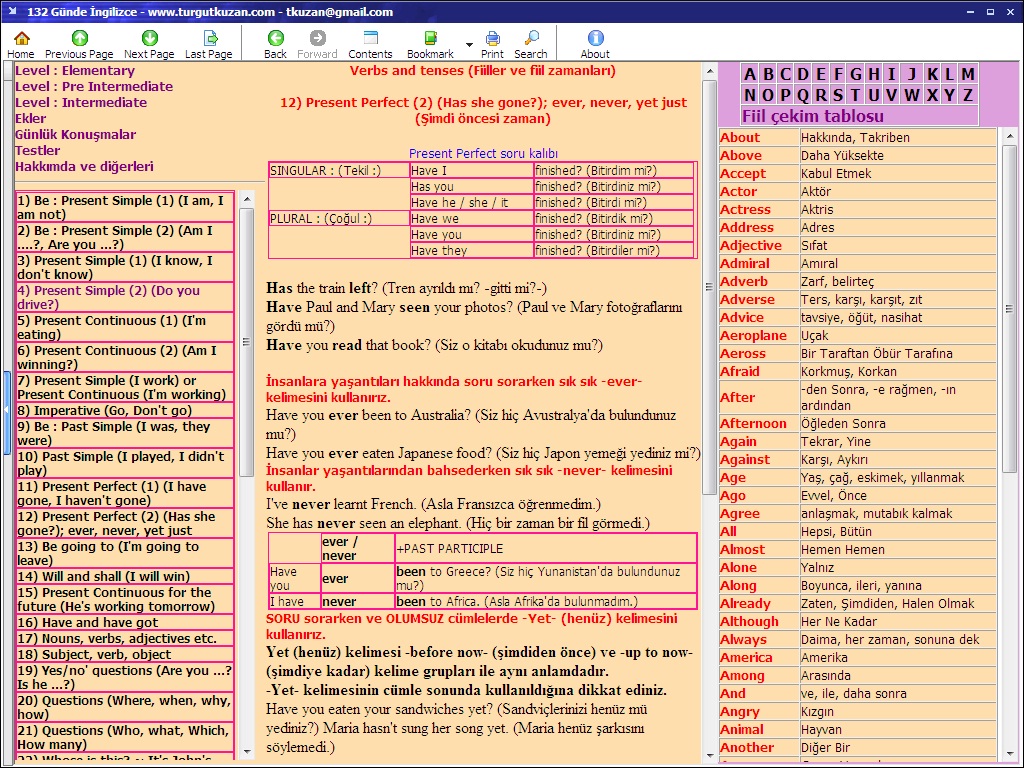
I, he, she, it, we, you, they + did not (didn’t) + fiil (normal hali – düzenli veya düzensiz fark etmez)ĭid + I, he, she, it, we, you, they + fiil (normal hali, düzenli veya düzensiz fark etmez) ?Įn çok kullanılan düzensiz fiillerin bir bölümü ve ikinci halleri: Geri kalanlar zaten düzenli olduğu için onlara –ed eki gelecek. Peki hangisi düzenli hangisi düzensiz ayrımı nasıl yapıcaz? Çözüm: Düzensiz fiilleri ve değişimlerini ezberlemek. Yani görmek anlamına gelen “see” fiili düzensiz fiil grubuna girdiği için böyle bir değişime uğruyor. İkinci cümlede ise “saw” fiili “see” fiilinin ikinci halidir. İlk cümlede kullanılan “watch” fiili düzenli fiil olduğundan –ed eki alarak geçmiş formu oluşturmuş. I, he, she, it, we, you, they + düzenli fiil (-ed eki alır) düzensiz fiil değişime uğrar. – The boy goes market and buys chocolate for himself.īu zaman zarfları genelde özne ile yüklem arasında kullanılır.īir de bu zaman zarflarına ek olarak kullanılanları da vardır. Genel değerlendirmede/Kalıcı durumlarda:.Günlük rutin işlerde/Düzenli aktivitelerde:.Ama özellikle nerelerde kullanıldığına göz atıcak olursak: Hiçbir zaman yapılmayan olayları da anlatmak için kullanılabilir. Simple Present Tense geniş zaman manasına gelir, yani temel olarak genelde gerçekleşen olayları anlatmak için kullanılır. Question Form: Do + I, we, you, they (veya çoğul özneler) + fill(yalın hali)?ĭoes + he,she,it (veya tekil özneler) + fill(yalın hali)? He, she, it (veya tekil özneler) + does not (doesn’t) + fill(yalın hali) Negative Form: I, we, you, they (veya çoğul özneler) + do not (don’t) + fill (yalın hali). He, she, it (veya tekil özneler) + fiil (s) harfi gelir. We are attending chess club this weekend.Positive Form: I, we, you, they (veya çoğul özneler) + fill (yalın).We’re having a staff meeting next Monday = all members of staff have been told about it.I’m meeting Jim at the cafe tomorrow = Jim and I have discussed this.(İngilizce’de şimdiki zamanlı cümle yaparken daha önce gördüğümüz gibi am/is/are + VERB (ing) şeklinde yapıyoruz.) İngilizce şimdiki zaman yapısını – aynı Türkçede olduğu gibi- kesin yapacağımız yakın gelecekten bahsederken kullanabiliriz. – Are you going to come to the party? – Are you coming to the party? (DOĞRU)Ģ- PRESENT CONTINUOUS TENSE (ŞİMDİKİ ZAMAN) Bu fiillerle cümle kurulurken present continuous tense (şimdiki zaman) kullanılması daha uygun olur. “Going to future tense” genellikle “go” ve “come” fiilleriyle kullanılmaz. They aren’t going to swim (Yüzmeyecekler) Aşağıdaki tabloda “going to future tense” yapısının olumlu, olumsuz ve soru yapılarını inceleyiniz. Going to future tense, daha önceden planlanmış ve karar verilmiş eylemler için kullanılır. İngilizce’de gelecekle ilgili planlardan, yapılması kesin olan şeylerden bahsederken What are you going to do tomorrow evening?.Who can you contact / call / keep in touch for more information?.How much will you pay for the event? / How much is the fee?.POSSIBLE QUESTIONS ABOUT AN INVITATION, E-MAIL OR LETTER I’m going to visit my uncle this weekend.I must … / I have to … / I’m going to … / I’m busy.GIVING REASONS AND EXPLANATIONS – MAKING EXCUSE What about studying for the exam together? MAKINGS OFFERS / SUGGESTIONS / INVITATIONS Laidback: They don’t worry about anything. They don’t think about needs or feelings of other people.īad tempered: They are often angry or in an angry mood.Īggressive: They always behave in an angry way. Self-centered: They think only about themselves. Sneaky: They behave in a secret or dishonest way. You can’t trust or depend on unreliable people. Stubborn: They don’t change their opinions easily.Īrrogant: They think that they are better or more important than others. Jealous: They feel angry or unhappy when somebody they love are interested in other people. They don’t share their friends’ secret with others. Reliable: They keep their friends’ secret. They are always there when someone needs them. Helpful / Supportive: They help/back up their friends. Loyal: They are always with their friends.

They don’t upset or annoy their friends.Ĭaring: They are kind and helpful. Tactful: They are very careful not to say bad things. They are sensitive to people around them. Understanding: They can understand their friends easily. They give money and share their belongings with friends. (KİŞİSEL ÖZELLİK VE ARKADAŞLIKLA İLGİLİ KELİMELER) GOOD FRIENDS ARE … VOCABULARY ABOUT PERSONAL TRAITS AND FRIENDSHIP Telling About Plans (be going to – present continuous tense).Understanding Invitation Cards, Letters And E-Mails.Giving Reasons And Explanations – Making Excuse.Makings Offers / Suggestions / Invitations.Vocabulary About Personal Traits And Friendship.Ünite Ders Kitabı Cevapları Meb Yayınları Ünite Ders Kitabı Cevapları Tutku Yayıncılık


 0 kommentar(er)
0 kommentar(er)
